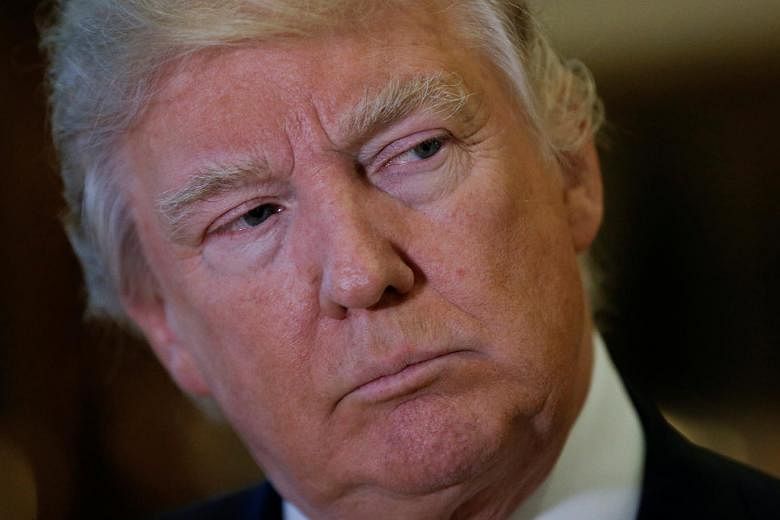WASHINGTON - An explosive but unsubstantiated political research report on Mr Donald Trump's links to Russia claims that Moscow holds deeply compromising information on the incoming US president.
American media and politicians had been in possession of versions of the 35-page report for months but declined to publish it as they were unable to corroborate its claims. Then on Tuesday (Jan 10), after several media reported that Mr Trump had been briefed on the allegations during a meeting with intelligence chiefs, BuzzFeed news took the controversial step of publishing the dossier in full - while admitting it was "unverified."
Here's a quick look at the issue so far:
What's in the dossier?
It includes unsubstantiated claims that the Russians possess videos involving prostitutes, filmed during a 2013 visit by Mr Trump to a luxury Moscow hotel for the Miss Universe contest. They were filmed supposedly as a potential means for blackmailing him and bribing him with business deals.
It also claims that the Trump campaign met with Russian operatives to discuss their hacking and leaking of e-mails and documents from the Democratic National Committee (DNC) and from Mrs Hillary Clinton's campaign chairman John Podesta. It says Moscow's campaign was directed personally by President Vladimir Putin and the aim was to sow "discord and disunity" in the US and within the Nato alliance.
The claims were presented as an appendix to a report by US intelligence on Russian hacking efforts during the presidential election. Although the material was not corroborated, intelligence agencies considered it so potentially explosive that they decided President Barack Obama, Mr Trump and congressional leaders needed to be told about it and informed that the agencies were actively investigating the claims.
Who compiled the report and why?
The author is reported to be Mr Christohpher Steele, a former officer in Britain's Secret Intelligence Service MI6. Sources said Mr Steele spent years under diplomatic cover working for the agency in Russia and Paris, and at the Foreign and Commonwealth Office in London. After he left the spy service, he supplied the FBI with information on corruption at FIFA, international soccer's governing body. It was his work on corruption in international soccer that lent credence to his reporting on Mr Trump's entanglements in Russia, US officials said.
Mr Steele was reportedly paid to compile the memos on Mr Trump before and after the presidential election , first for a Republican rival of Mr Trump before the presidential nomination, and later by Mrs Hillary Clinton's Democratic campaign.
Mr Steele reportedly went underground after his identity was revealed. Neighbours told the media that he hurriedly left his home in Surrey county, south-west of London, on Jan 11.
What is Mr Trump's response so far?
Mr Trump has called the news "fake" and a "total political witchhunt". He was outraged after the US media reported on Jan 10 that some of the dossier's allegations were included in the intelligence briefing, which was presented by FBI director James Clapper, together with the heads of other agencies such as the Central Intelligence Agency (CIA) and National Security Agency (NSA). That lent the dossier some credibility, and it was then published online by BuzzFeed, adding to Mr Trump's outrage.
"Intelligence agencies should never have allowed this fake news to 'leak' into the public. One last shot at me. Are we living in Nazi Germany?" he tweeted on Jan 11.
At a news conference later that day - his first since he won the election on Nov 28 - Mr Trump conceded for the first time that Russia had carried out cyberattacks against the two major political parties during the election. But he angrily rejected the reports that Moscow had gathered salacious personal and financial information about him that could be used for extortion.
"I think it was disgraceful - disgraceful that the intelligence agencies allowed any information that turned out to be so false and fake out."
Mr Trump dodged questions about whether his campaign had contacts with Russian intelligence, instead tearing into reporters whose outlets reported on the allegations of the existence of compromising material. He accused TV network CNN of generating "fake news" and slammed BuzzFeed as "a failing pile of garbage".
"I'm not going to give you a question. You are fake news," he told a CNN reporter, igniting a fresh raft of questions about his respect for constitutional guarantees about the free press.
What could happen to Mr Trump?
The FBI has been investigating the claims, and the Democrats are demanding a thorough inquiry into the reports that Trump representatives met with Russian officials during the campaign. But come Jan 20, Mr Trump will be in charge of the FBI and the other intelligence agencies, and he may not approve such an investigation, according to New York Times.
The Guardian said the extent of the fallout on Mr Trump depends on whether there is the appetite to pursue the claims. It said even though Congress has formidable powers to subpoena witnesses that have the potential to uncover secrets that others cannot reach, and two Republican senators John McCain and Lindsey Graham have been pushing for a no-holds-barred investigation, the Republican party leadership has so far shown no appetite for rocking the boat with their new president.
Even if the claims are later found to be true, it still remains to be seen if Mr Trump would be impeached, the report said, adding that it would take "an almighty severing of ties between Trump and his own party to even get close to such a place".
SOURCES: AGENCE FRANCE-PRESSE, REUTERS, NEW YORK TIMES.

